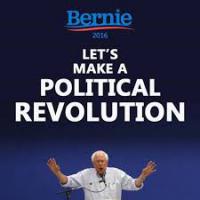
Even a somewhat cynical 71 year old socialist like me could be thrilled to see Bernie Sanders talking about the need for an American political revolution on MSNBC. To be honest, I’m not sure that I ever expected to see a leading presidential candidate say we need a revolution on prime time TV.
When Bernie Sanders says we need a political revolution, he’s mostly talking about turning many thousands of new people out to vote. That would obviously be a very good thing. It’s just not enough to win the meaningful social changes that would add up to a political revolution.
For example, Sanders was appearing in what MSNBC billed as the “First in the South Presidential Forum.” Until just over 50 years ago, very few Black people could vote in the South. Only a real political revolution won that most basic democratic right.
It began when tens of thousands of Black people in Montgomery walked for six months rather than ride the segregated buses. Soon there were sit-ins and freedom rides, demonstrations and marches. Hundreds of thousands of people took to the streets. Many were arrested. Some were killed.
Even when voting rights had been won, Dr. Martin Luther King Jr. found that they weren’t enough without jobs, housing and an end to poverty. Of course Bernie Sanders wants those things too. But it was King who insisted they had to be fought for in the streets not just at the ballot box.
Before he died Dr. King was organizing the Poor People’s Crusade to bring tens of thousands of people to Washington and shut the government down until Congress acted to end poverty. So far Bernie Sanders’ political revolution doesn’t seem to involve that kind of radical popular mobilization.
Now Sanders has built his presidential campaign largely around preserving and expanding New Deal programs like social security and unemployment insurance. They weren’t won because Franklin Delano Roosevelt was some kind of people’s champion. Or even because the Democrats had big majorities in both the House and Senate. Instead it took a massive, militant popular movement extending from the plants into the communities.
The Congress of Industrial Organizations (CIO) was built on a national wave of sit-down strikes. The Flint Sit Down that brought the first UAW contract has become legendary. Not too many people know that steel workers, rubber workers, and even bakery and Woolworth workers sat down too.
The CIO was never non-violent. Strikers fought hand to hand battles against scabs, cops and even the National Guard. Longshoreman, auto workers, steel workers and Teamsters died fighting for the union.
In communities like Harlem, it was very hard for landlords to even evict unemployed people who couldn’t make the rent. As soon as the cops put people on the street, their neighbors put their furniture right back in. Confronted by large, angry crowds, the cops often thought discretion was the better part of valor.
As difficult as it may be to believe today, many in the political and economic establishment seriously believed that unless they made major reforms they were likely to face a socialist revolution.
The civil rights movement and the CIO are what actual political revolutions look like. It would probably take something close to them to win even some of Bernie Sanders’ goals – such as ending poverty, equal pay for women, reversing climate change, full employment, free public education, and universal health care.
Bernie Sanders isn’t going to get the 2016 Democratic Presidential nomination. The Democratic Party establishment, the millionaire donors, the mainstream media and even the top leaders of most AFL-CIO unions will make sure of that.
Many of us had hoped that Sanders would run an independent presidential campaign. Unfortunately, he’s made it perfectly clear that’s never going to happen. He’s promised the Democrats that come November, he’ll be out there campaigning for Hillary.
Even so, Bernie Sanders could still work for a political revolution after the November election is over. He could do it by joining the social movements that can win the real social change we need so badly.
Bernie could be there any time an innocent African-American is murdered by the cops. He could speak at climate change demonstrations from coast to coast. He could walk the picket line with minimum wage workers demanding $15 an hour. These kinds of actions would accomplish much more than getting out the vote for Democratic politicians.
What we know for sure is that Bernie is absolutely right when he says the U.S. needs a political revolution. His campaign is probably introducing the idea to millions of people who never even considered it before. But if we’re going to have a political revolution, we’ll have to make it through grassroots struggle, with or without Bernie Sanders.
This article originally appeared in Socialist Worker.


Sanders and Clinton
As I recall Sanders said he’d endorse Clinton if he lost the primary. I don’t remember him saying that he’d be *campaigning* (actively working for) Clinton.
I sincerely hope he won’t be at the Democratic National Convention singing her praises.